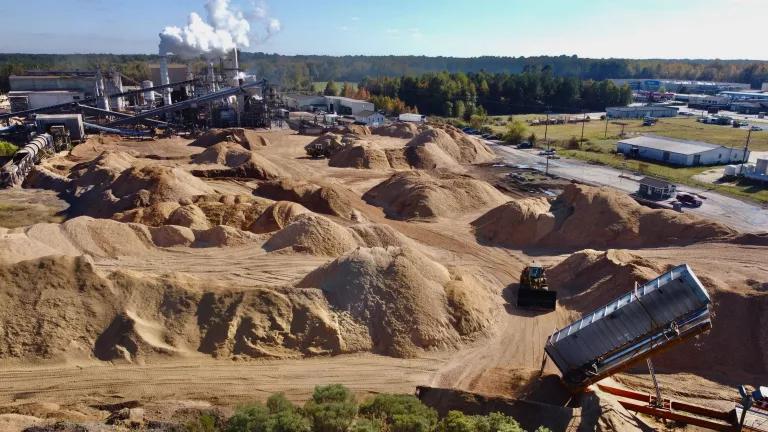Why You Should Care About the CFTC Report on Climate Risk
Climate campaigners have had great success in stopping specific projects that damage the climate by intervening in environmental and other permitting processes. The financial regulatory system provides a new opportunity for climate action in a way that goes beyond projects to influence whole companies and entire sectors of the economy.
A network of regulatory agencies oversees the economy with the goal of ensuring, to the extent possible, that the overall financial system operates smoothly. For example, the Board of Governors of the Federal Reserve System oversees monetary policy, banks, and the stability of the financial system and the Securities and Exchange Commission (SEC) ensures the fair and efficient functioning of the public securities markets, where most people buy and sell stocks.
As part of their duties, these regulators must identity the risks that threaten the economy. Financial regulators around the world—led by countries as diverse as the UK, Mexico and China—increasingly recognize that climate-related financial risk is one of the gravest risks to the global economy and the financial system. Climate-related financial risk is sometimes divided into physical risk and transition risk. Physical risk refers to risk to assets from changes in climate and related extreme weather, such as coastal damage from extreme storms or wildfire damage. Transition risk refers to the risk to the economy (and economic actors) arising from structural changes to the economy resulting from the low carbon transition, such as declining value of fossil fuel production or service businesses. Unfortunately, the U.S. under the current administration has had its head in sand on this issue—until now.
A group of experts recently convened as a subcommittee of the Commodity Futures Trading Commission (CFTC) issued a major report urging U.S. financial regulators to address the systemic risk to the U.S. financial system posed by climate change. In the words of the report:
[t]he central message of this report is that U.S. financial regulators must recognize that climate change poses serious emerging risks to the U.S. financial system, and they should move urgently and decisively to measure, understand, and address these risks.
Why is it so important for U.S. financial regulators to incorporate climate risk into their oversight of the U.S. financial system?
There are two principal reasons why this task is critical. First, as we have learned during the current COVID-19 epidemic, adverse financial events cause enormous human pain. Like those caused by pandemics, financial dislocations caused by climate change--whether from physical events such as rising temperature or unprecedented storms, or from the transition to a low-carbon economy—are not an abstract consideration but something that will impact everyone’s lives.
Second, the reshaping of our economy to address the consequences of climate change will require huge changes in investment. But this can happen only if the power of the financial markets is harnessed in this effort. Investment through government spending will not nearly be enough. However, to cause this massive change in investment, there must be market signals to motivate the relevant financial players, such as operating companies, investors, lenders, and insurers. By including climate change in the risks they regulate, financial regulators will help create these market signals.
Who issued the report?
The CFTC is the federal agency tasked with regulating the commodities (e.g., agricultural, metal, and energy) and derivatives markets. CFTC Commissioner Rostin Benham convened the subcommittee, called the Climate-Related Market Risk Subcommittee. This ambitious report addresses the steps that should be taken across all relevant federal financial regulatory agencies, not just the CFTC.
Why is the report important?
The report is the first statement by a subcommittee of a major federal regulatory agency that climate risk must be actively managed by financial regulators because it poses a potential risk to the entire U.S. financial system. It is both an affirmation of the severity of the financial risk of climate change and a detailed prescription of specific actions that can be taken by regulatory agencies to begin to address this risk.
One of the most remarkable things about the report is that it was unanimously approved by the subcommittee, which had more than 30 members encompassing a wide range of interests and perspectives, including representatives of major banks (Citigroup and JPMorgan Chase), an insurance company (Marsh & McClellan Companies), energy and agricultural market participants (e.g., BP, ConocoPhillips, and Cargill), investors (e.g., Vanguard and CalPERS), asset owners, universities, think tanks, and NGOs (Ceres, Environmental Defense Fund, The Nature Conservancy, World Resources Institute).
The composition of the subcommittee, its unanimity, and the fact that the comprehensive report bears the imprimatur of a major U.S. regulator means that it is likely to be influential.
What are some of the important actions urged by the report?
- All financial regulators should address climate risk in their mandates. All relevant federal financial regulatory agencies should incorporate climate-related risks into their mandates and develop a strategy for integrating these risks in their work, including into their existing monitoring and oversight functions. In terms of real-world impact, this would mean that financial regulators would push financiers and corporations to address climate risk in their planning, risk management, and public disclosure (such as annual reports).
- U.S. financial regulators should engage with their international counterparts. Lead by the Bank of England in the UK, the rest of the world, and particularly Europe and China, have pioneered efforts to integrate climate risk into economic and financial assessments. Federal financial regulators should actively engage their international counterparts to exchange information and draw lessons on emerging good practice regarding the monitoring and management of climate-related financial risks. U.S. regulators should join, as full members, groups convened for this purpose, including the Central Banks and Supervisors Network for Greening the Financial System (NGFS), the Coalition of Finance Ministers for Climate Action, and the Sustainable Insurance Forum (SIF).
- Financial firms should be required to address climate risk as part of their risk management. Financial supervisors should require bank and nonbank financial firms to address climate-related financial risks through their existing risk management frameworks in a way that is appropriately governed by corporate management.
- Regulators and financial institutions should undertake climate stress testing. In this context, a stress test is a “what if” analysis, assessing how an institution would fare in the face of a severe climate scenario or trajectory. Stress tests are important because they force institutions to think in a granular way about how prepared they are to deal with possible extremely adverse events. Working closely with financial institutions, regulators should undertake—as well as assist financial institutions to undertake on their own—pilot climate risk stress testing as is being undertaken in other jurisdictions and as recommended by the NGFS.
- Congress should put a price on carbon. While recognizing that this would require legislation, the report states as a fundamental finding that “financial markets will only be able to channel resources efficiently to activities that reduce greenhouse gas emissions if an economy-wide price on carbon is in place at a level that reflects the true social costs of those emissions.” In other words, the cost of carbon and other greenhouse gas emissions must be “internalized” into the price of all goods and activities to reflect the cost of the emissions they generate, directly or indirectly.
- Additional subjects addressed. These include developing consistent, comparable, and reliable climate risk data and analysis; guidelines for climate scenario analysis; principles for effective climate risk disclosure by corporations; and growing a “net-zero economy” (achieving a net neutral balance between GHG emissions produced and removed from the atmosphere).
What would be the practical impact of implementing the report’s recommendations?
Including climate risk in regulatory agency mandates would lead to changes in the behavior of regulated entities. For example, the Federal Reserve could require banks to reduce their exposure in their portfolios to carbon intensive industries, so that bank failures don’t result from the decline of fossil fuels. As another example, regulators could require companies to manage climate-related financial risk (such as through climate stress tests) and to undertake robust disclosure of climate risks and strategies for addressing these risks. Only in this way can investors reward companies that take climate risk seriously and penalize those that do not, changing incentives to reshape our economy.
What should climate campaigners do to support this effort?
Climate campaigners should learn about how the different levers wielded by regulatory agencies could be used to address climate-related financial risk. They can act on this knowledge by adding their voices to the regulatory process, for example, by submitting public comments and meeting with agency officials. A great resource is a report by Ceres, a nonprofit investor group, Addressing Climate as a Systemic Risk: A call to action for U.S. financial regulators. It provides a list of over 50 actions that regulators can take under current law, which climate campaigners can add to their federal advocacy strategies. Many of these track the recommendations in the CFTC report.
In sum, the report is an impressive achievement. While perhaps not as strong in some respects as we would prefer, it is a unanimous clarion call, proclaiming the need for financial regulators across the U.S. government to incorporate climate change risk to the U.S. financial system into their regulatory mandates, as they would do with any systemic risk, and providing extensive prescriptions of specific actions regulators can take, for the most part under current law, to carry out this mandate.
Climate campaigners should urge the regulatory agencies to seize the gauntlet!



